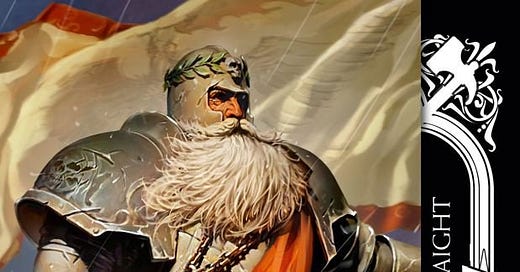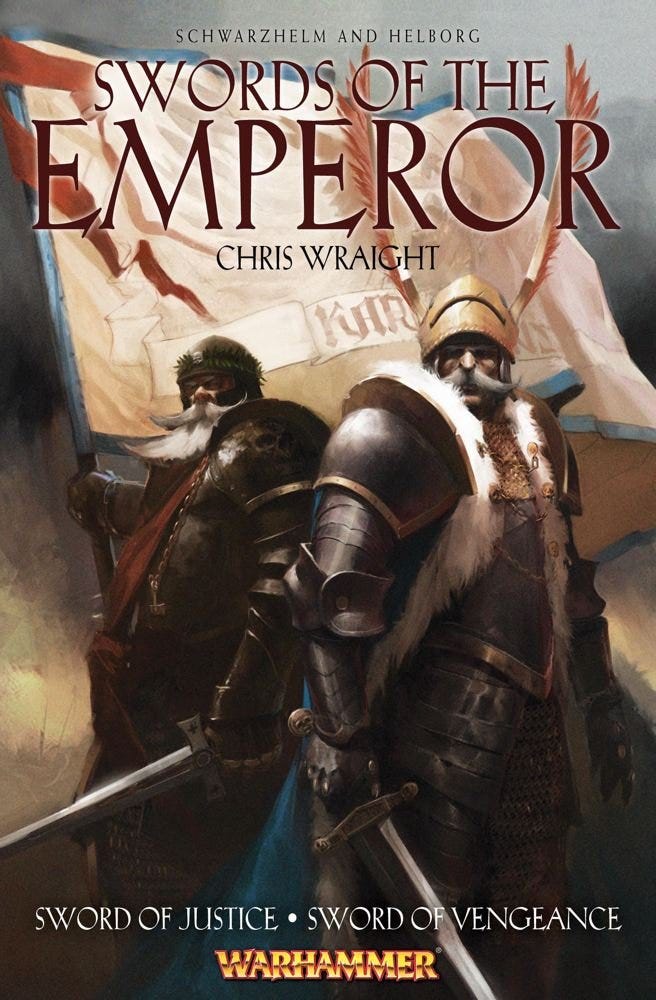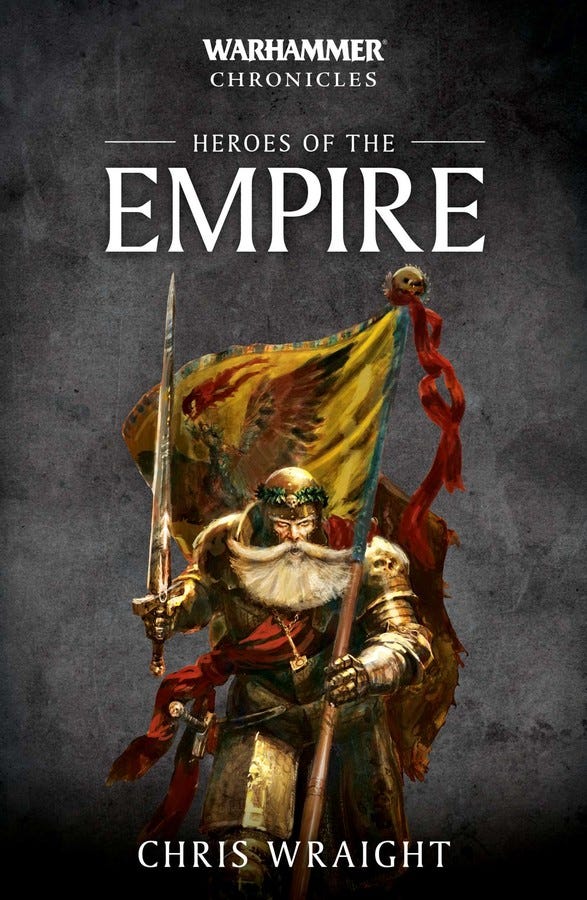Sword of Justice by Chris Wraight - A Warhammer Novel Review
The Empire's second greatest champion uncovers a conspiracy in his homeland, in a Warhammer Heroes novel where Ludwig Schwarzhelm doesn't quite live up to the legend
Sword of Justice by Christ Wraight
Published in 2010
Warhammer Heroes: Sword of Justice by Chris Wraight follows Ludwig Schwarzhelm, personal champion and standard bearer of Emperor Karl Franz. He’s a tireless soldier used to being in someone else’s shadow. But private doubts and increasingly ugly rivalries erupt during a disastrous, conspiracy-drenched return to his home province of Averland. Tasked with settling a succession crisis, Ludwig teeters in the face of the Empire’s labyrinthine politics and darker conspiracies.
Warhammer Heroes was a Black Library series in the twilight years of Warhammer Fantasy, with each novel showcasing a special character from the tabletop game. Game characters were never strangers to Warhammer prose (as early as Karl Franz playing a significant role in Drachenfels in 1989), but it was rare for them to serve as protagonists. That sort of miniature/publication crossover is more prominent in current Black Library novels, and Warhammer Heroes was an initial foray.
Sporting a curt, action-oriented writing style relying on dark but not particularly imaginative imagery, Chris Wraight’s work plays nicely with the unsmiling Ludwig. Sword of Justice has a good grasp of dramatic duels and large-scale battles – something that should be a given for Warhammer fiction but can be hard to make consistently interesting. Besides those more direct elements, the book presents a decently faithful, compelling image of the Empire, and the same can be said for the adversaries featured. Sword of Justice emphasizes the fractious balancing act of Imperial politics and doesn’t shy away from the ugly realities of living under even the “best” nobility has to offer.
Broadly, it’s everything I want from an Empire book, but the story itself falls short of the mark. Wraight’s characters are serviceable, with some memorable moments scattered throughout, but they’re a notch or two below his worldbuilding and action. The cast leans too much into tropes and lacks a certain believability. Ludwig suffers a particularly ironic fate; the book’s central premise is that being constantly overshadowed finally gets to him, and he still feels like a spectator in his own book.
Ludwig gets a few moments to live up to the Warhammer Heroes series’ promise of breathing life into players' favorite pieces. If nothing else, the book shows he’s more than just an unthinking agent of royal justice. With humble origins compared to his noble peers, he’s painfully aware of the Empire’s shortcomings but too straightforward and hidebound to do anything about them. However, most of the book follows a rotating cast of gruff warriors under his charge, along with some sneaky but disposable adversaries.
In the introduction to the omnibus edition, Wraight declares he’d love to write a book following Pieter Verstohlen, Ludwig’s elusive, witch-hunter-like agent. I’d argue Sword of Justice already feels more like Verstohlen’s book – Ludwig spends most of his arc paralyzed by politics or pushed out of the main events by sorcerous plots. Preserving the mystique of major, setting-relevant characters is a recurring struggle for Black Library novels, so usually I like this sort of outsider perspective. Unfortunately, it goes too far here.
It would help if Verstohlen were more compelling. While better suited to navigating the trickier parts of Imperial society, his motivation is generic: avenging a wife killed by Chaos cultists. Unfortunately, the only women in Sword of Justice are barely seen lovers, sex workers, or tragically slain spouses.
The constant switch in perspective and running plot threads are handled decently enough, though some elements (notably Ludwig himself) suffer for it. Some of the briefly glimpsed characters are more interesting than what we see of Verstohlen and Ludwig. Of note is Tochfel, the loremaster administering the legal mechanisms of the succession. His laments at a province run aground by brutal tyrants and mad rulers are some of the more convincing moments.
Ironically, the witch hunters Verstohlen despises end up being more fully realized – the one we get a POV chapter of reveals a man refusing to acknowledge the immorality of his actions, even at the expense of his sanity. Much more compelling stuff than Verstohlen’s aimless revenge plotline.
Sword of Justice has its strong moments, but it’s part of a duology and feels like it – even at 350-plus pages, it’s not a complete story. I hope that Sword of Vengeance, the Helborg-focused follow-up, tidies things up, but I do wonder if the Averland conspiracy plotline can sustain such a large page count.
In addition to its paperback release, Sword of Justice received a slipcover reprint with Sword of Vengeance, along with a paperback omnibus edition, Swords of the Emperor. A more recent Warhammer Chronicles omnibus was also published under the title Heroes of the Empire.
Swords of Vengeance and its non-chronicles omnibus are easy to find in print at MSRP or below, and a digital edition is available through Black Library.









Your reviews keep on getting better and better. Well done!